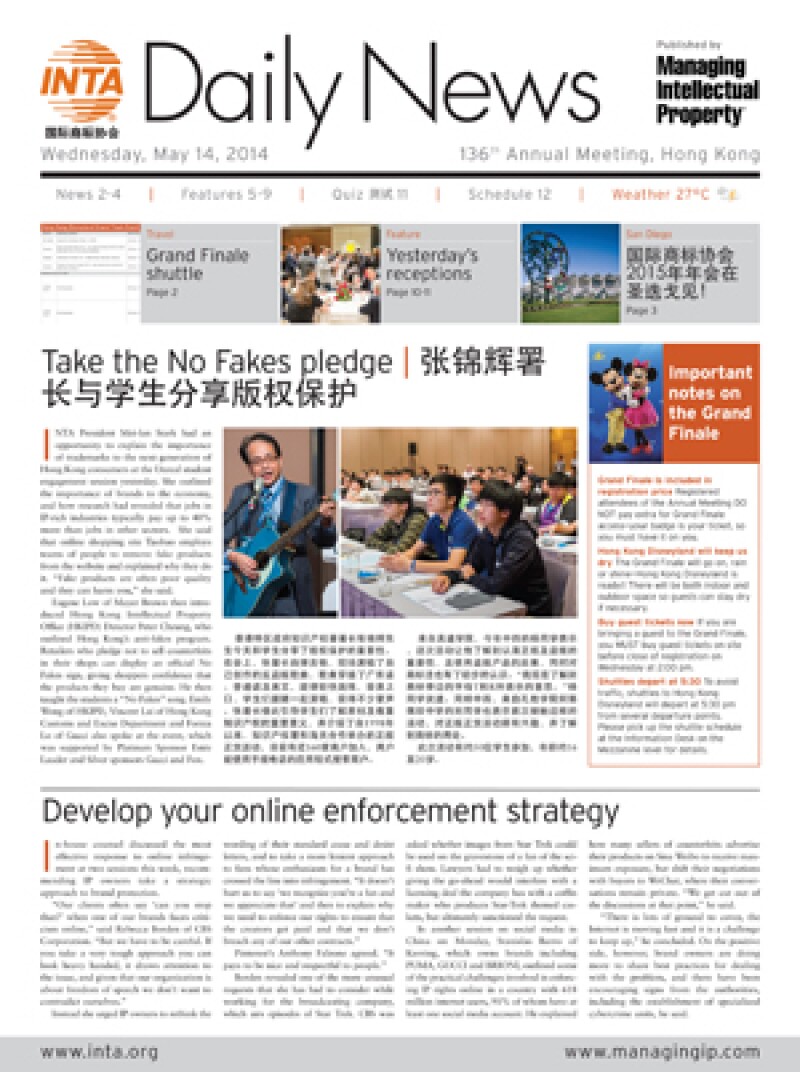
Most of the Managing IP team has been in Hong Kong this past week for the 136th INTA Annual Meeting, where among other things we have been publishing the INTA Daily News and also launched our New IP STARS publication.
It’s the first INTA Annual Meeting to be held in Asia, and only the third to be held outside of North America (after Amsterdam in 2003 and Berlin in 2008). But two decades after USTA became INTA, the location reflects the internationalisation of trade mark work, and in particular the growth of China.
It’s a trend that will speed up. INTA is running many other events in the region (see our interview with its CEO Etienne Sanz de Acedo) and it announced during this meeting that from now on every third year the Annual Meeting will venture outside North America. It will go to Vienna, Austria in 2017 and come back to Asia in 2020. The city has not yet been announced, though Singapore, Tokyo and possibly Shanghai are the obvious contenders.
Holding the Meeting here has meant that a few things are different. The most obvious is that there are more attendees from the Asia-Pacific region (2,748 out of 8,580) and fewer from North America (1,890). But another trend that I know a few people have picked up is the greater participation of government officials.

|
INTA held a reception for government officials yesterday |
All of the TM5 offices have been represented here, and indeed have hosted some important meetings. WIPO, OHIM and KIPO are among those that have stands and OHIM and the JPO both hosted users meetings on Sunday.
WIPO also ran its now well-established information sessions on the Madrid and Hague Systems, and this year it was striking that there were representatives of the national offices of countries as far afield as India, Mexico and Tunisia as well as the regional African offices ARIPO and OAPI.
It’s not just IP offices. During the week there was also an update from a group of IP attachés, while organisations such as Icann have been represented in the educational programme. One of the more controversial sessions this week covered plain packaging of tobacco products and the pending WTO case (Emma Barraclough has more to say about this).
What should we make of this trend? I think partly it reflects the location and the close ties that exist between business and government in this part of the world, but it’s also partly a longer-term trend that is seeing greater regulatory interest in trade marks, something that arguably patent and copyright owners have already experienced.
On one hand, businesses might be alarmed at that. Certainly many brand owners are wary of advertising regulation such as the plain packaging laws, and also of increased restrictions on the internet post-Snowden.
On the other hand, a more positive view would be that it’s good to see governments and industry engaging at an event like this, and that trade mark specialists should use the opportunity to raise their concerns, in particular regarding counterfeiting and combating anti-IP sentiment (on which point, see our interview with INTA President Mei-lan Stark).
So overall, if we’re right about this trend, it should be good news for trade mark owners, and one that we hope will continue. Do you agree?









